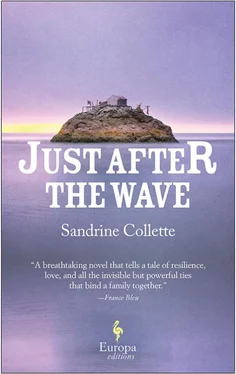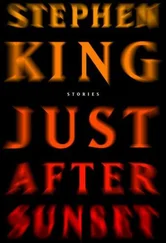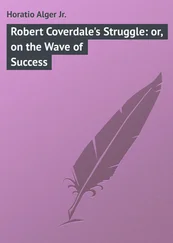“That’s where the boat was,” Noah points out.
“Yes, but maybe they turned.”
“I don’t know,” says Louie, because they were asking him.
How many times since the parents left has he had to say this. I don’t know. He feels his helplessness right down to the stinging in his fingertips.
“But then,” says Perrine, “can we be sure Pata will come back this way? What if he goes past the other side of the island?”
Louie freezes for a moment. He hadn’t thought of that. For him there is only one place where the boat can land, and the watchtower is right opposite that place. He frowns: No.
Perrine insists.
“But still, if he—”
“No!”
Louie stands up on the platform and stamps his foot.
“And anyway, he would go around the island to come and get us. He’ll call out to us.”
“So we shouldn’t sleep, then,” says Noah gravely. “Otherwise we won’t hear him.”
“That’s why we built the tower.”
“So we’ll be here even at night?”
“We’ll take turns, yes.”
The little boy’s eyes gradually open wider, and he purses his lips. The tower all on his own, in the middle of the night; that’s not how he had envisaged things.
“Even me?”
There’s a tremor in his voice. Louie shrugs his shoulders:
“Are you scared?”
“Like I would be.”
“So what is it, then?”
“It’s just, uh, if it starts to rain, you know. This—” he points to the sheet roof—“this won’t keep the rain out, will it?”
Louie shrugs.
“We’ll see.”
* * *
First night on watch. The weather has stayed warm and Louie can see the stars scattered across the sky. He hears the sea lapping regularly against the shore, shlap shlap , a sort of calm, repetitive lullaby. He listens to the sounds all around, and has trouble identifying them: tiny cries, rustling, animal sounds—and yet everything was drowned two weeks ago, there’s nothing left, he pricks up his ears to see if he can recognize something.
The hens? Or a surviving bird, lost in the night.
The sea lapsing onto a leaping fish.
Something else?
He thinks of Perrine and Noah back at the house asleep. With these boards beneath his back, hard despite the blankets, too much darkness, too much light, he cannot sleep. When the sounds vanish, the silence makes him sit up. He wishes dawn would come. In the end, it’s pointless keeping watch at night.
Will Pata come back? If the sea doesn’t carry them away first. The water around him is oppressive, a sort of living creature looking for cracks to slip through, to gnaw at the foundations of the house, and of the tower, to dig in silence until everything collapses all of a sudden. For three days Louie hasn’t said anything, but he’s afraid.
He kneels on the board. He does so without thinking, the way he used to. For two years he hasn’t been doing it anymore because it’s for little kids—Madie tried to persuade him to, in the beginning. Tonight it has come back to him. With his eyes closed before the immense ocean, his hands joined in mute supplication, Louie prays, as hard as he can.
Perrine wakes him in the morning, calling his name. Louie? He struggles to rouse himself. A sort of titanic fatigue; he’s not sure he has the strength to stand up or even open his eyes.
“Louie?”
He has to answer, he knows. A grunt at best.
“Are you asleep?”
“Mmm.”
“It’s nine o’clock.”
Nine o’clock. Louie sits up all of a sudden, his heart pounding, sweat on his brow.
“Really?”
“Yes, that’s what it says on the kitchen clock. Were you asleep?”
“No. No, no. Or maybe a little…”
“So you didn’t see anything?”
Louie rubs his face, haggard. Morning moodiness: he must have fallen asleep in the middle of the night and didn’t realize when day was breaking. He was supposed to be watching the horizon for the last three hours.
“Oh.”
Perrine presses her hands on her T-shirt.
“What if Pata went by?”
“He wouldn’t have, not yet. This is just practice, you know.”
Tears in the girl’s eyes.
“But you said—”
“It’s no big deal, Perrine, he didn’t go by, I promise. The sound of the boat would have woken me up for sure. Come on, let’s go get breakfast.”
The hens welcome them with a loud cackling, running to meet them at the door of the house as if the children’s arms were full of seed and salad leaves and worms. Louie holds out his hand and doesn’t flinch when they peck at his palm.
“What can we give them to eat? There’s not much on the island.”
But Perrine shakes her head:
“We don’t have anything for them, they’ll just have to manage. We don’t have enough. And anyway in the letter Mommy said we have to eat them if we’re hungry.”
Louie scowls. He’s attached to his hens. He’s the only one who knows them by name, all twenty-eight of them, even the rooster: before the tidal wave there were fifty of them and it was no different. He could tell you the name of every one that drowned, too, the ones he called by their size and their color, Little Black, Big Black, Big White Feather, Old Black. The ones he liked best and which had real names, like Peanut or Sulky, or the names of his classmates when he’d run out of ideas, Caroline and Sophie and the others. The only one he doesn’t really like is the rooster, he has no idea why, he’s more arrogant, stupider, or maybe it’s his color, but the thing is you have to have a rooster, if you want chicks who’ll turn into young hens, that’s the way it goes.
In the beginning, Pata had taught them that you had to keep them in separate groups so that the rooster wouldn’t go messing around—that’s what he’d said, messing around —and that they would wait for a second little rooster to be born and then make two little harems, so there wouldn’t be too much consanguinity. But when they had two roosters, and the time came to move the hens from one group to the other, the father got muddled, and didn’t know which hens were supposed to go with which rooster. All the children down to Sidonie had given their opinion: this rooster with these hens, and it was by no means certain that the yowling of the somewhat panic-stricken farmyard animals was any worse than that of the children who were choosing them, and the father couldn’t identify any of them anymore, he gave a good shout so that at least the kids would shut up, but there was nothing for it, he couldn’t make head nor tail of it all. After that, several hens got loose and the groups got mixed up; the father listened to his older boys telling him which hens to put back with which rooster—until he realized that the kids were grouping the fowl by color and it was all a hopeless mess. In the end the father had taken one of the roosters and wrung its neck just so they’d have some peace and quiet. They’d figure out later what to do. And in fact it went no further, there was just one rooster and the hens didn’t seem to mind at all.
Why don’t we eat the rooster? says Louie.
But Perrine doesn’t want to: she knows that hens are much tastier.
“No,” says Louie.
His little sister begs him: Just one.
“No, we’re not hungry yet, not really, and besides, we have the eggs.”
“Yes, we are hungry.”
“We are,” adds Noah, holding his tummy.
Louie looks at the sky, the low gray clouds, the wind hustling them along. Maybe today he can: he is thinking of the island where the potatoes grow. With the swim ring they hid in the barn he can bring back enough to make a gratin, or mashed potatoes, an entire potful. But the waves will have to behave, the gusts have to stay calm so as not to tip him over, he remembers how Liam and Matteo nearly drowned a few days ago.
Читать дальше












